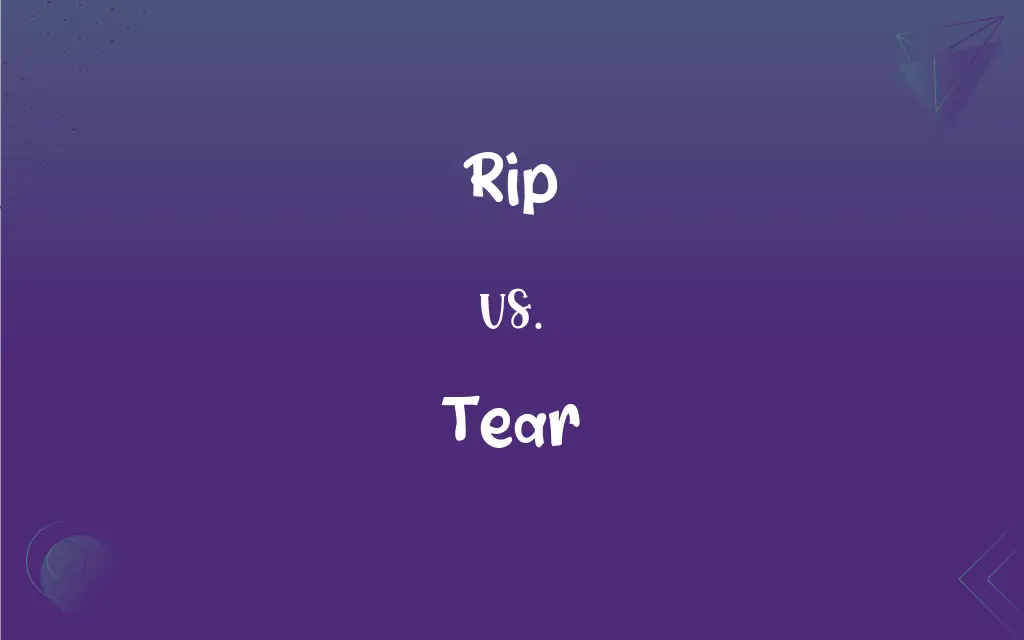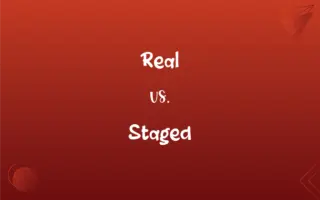Rip vs. Tear: What's the Difference?
Edited by Harlon Moss || By Janet White || Updated on September 28, 2023
Rip refers to splitting something apart forcefully along the grain or weave, while tear implies pulling apart of something more irregularly, often involving fabric or paper.

Key Differences
The terms rip and tear refer to actions that result in the damaging or separating of an object, often fabric or paper. Rip typically denotes a forceful action that separates materials along a straight or defined line, usually along the grain or weave. This action often occurs quickly and is associated with a sharp sound. Ripping can happen intentionally or unintentionally, and it often results in a neat, straight damage line, especially when the material has a pronounced weave or grain.
In contrast, tear usually implies a more irregular, often jagged separation of materials. Tearing might not follow the grain or weave of a material and often results in an uneven edge. It can be the outcome of strain or stress applied to a material, causing it to pull apart in different directions. Tear is often associated with materials like paper or fabric, where the separation doesn’t follow a predefined line, making the resultant edges uneven and rough.
When comparing rip and tear, the intentionality and the precision of the action are crucial elements. A rip can be both a deliberate action, like ripping a piece of paper along a perforated line, or an accidental occurrence, like ripping one’s jeans on a nail. The result of ripping is generally a straight line or a separation that follows a certain pattern inherent to the material.
Tear, on the other hand, usually results from an unplanned action, often yielding unpredictable and irregular outcomes. The process of tearing can be more violent and abrupt, leading to a more chaotic separation of material. While tearing can be a result of intentional action, it frequently occurs due to accidental pulling or straining of a material, leading to uneven, jagged edges.
In practical usage, the distinctions between rip and tear can blur, and these terms are sometimes used interchangeably. However, the underlying difference lies in the pattern and irregularity of the separation, with rip being more structured and tear being more erratic. Both terms represent actions causing the separation or damage of materials but convey different nuances in the manner and outcome of the separation.
ADVERTISEMENT
Comparison Chart
Nature of Action
Usually forceful and quick, along the grain or weave
Often more irregular and jagged, without following a grain
Intentionality
Can be both intentional or unintentional
Usually unintentional and abrupt
Result
Straight or neatly defined line or separation
Uneven, unpredictable, and rough edges
Associated Materials
Materials with pronounced weave or grain like fabric
Any material but often fabric or paper
Sound
Often associated with a sharp sound
Might not produce a distinctive sound
ADVERTISEMENT
Rip and Tear Definitions
Rip
To remove something quickly and violently.
He had to rip the bandage off his wound quickly.
Tear
To cause emotional pain or distress.
It will tear me apart if I have to leave my hometown.
Rip
A stretch of water in a river, estuary, or tidal channel made rough by waves meeting an opposing current.
Tear
To pull apart or into pieces by force; rend.
Rip
A rip current.
Tear
To cause to be pulled apart unintentionally, as by accident
Tore my pants on the barbed wire.
Rip
A dissolute person.
Tear
To lacerate (the skin, for example).
Rip
An old or worthless horse.
Tear
To make (an opening) in something by pulling it apart or by accident
I tore a hole in my stocking.
Rip
A tear (in paper, etc.).
Tear
To separate forcefully; wrench
Tore the pipe from the wall.
Rip
A type of strong, rough tide or current.
Tear
To divide or disrupt
Was torn between opposing choices.
A country that was torn by strife.
Rip
(Australia, New Zealand) A rip current: a strong outflow of surface water, away from the shore, that returns water from incoming waves.
Tear
To become torn
The fabric does not tear easily.
Rip
(slang) A comical, embarrassing, or hypocritical event or action.
Tear
To move with heedless speed; rush headlong
Tore off down the road.
Tore along the avenue.
Rip
(slang) A hit (dose) of marijuana.
Tear
To become filled with tears
The strong wind caused my eyes to tear.
Rip
A black mark given for substandard schoolwork.
Tear
The act of tearing.
Rip
(slang) Something unfairly expensive, a rip-off.
Tear
The result of tearing; a rip or rent
The shirt has a small tear.
Rip
Data or audio copied from a CD, DVD, Internet stream, etc. to a hard drive, portable device, etc.
Some of these CD rips don't sound very good: what bitrate did you use?
Tear
A great rush; a hurry.
Rip
Something ripped off or stolen; a work resulting from plagiarism.
Tear
(Slang) A carousal; a spree.
Rip
A kind of glissando leading up to the main note to be played.
Tear
A drop of the clear salty liquid that is secreted by the lachrymal gland of the eye to lubricate the surface between the eyeball and eyelid and to wash away irritants.
Rip
Ellipsis of ripsaw.
Tear
Tears A profusion of this liquid spilling from the eyes and wetting the cheeks, especially as an expression of emotion.
Rip
A joyride.
Tear
Tears The act of weeping
Criticism that left me in tears.
Rip
A wicker basket for fish.
Tear
A drop of a liquid or hardened fluid.
Rip
A worthless horse; a nag.
Tear
(transitive) To rend (a solid material) by holding or restraining in two places and pulling apart, whether intentionally or not; to destroy or separate.
He tore his coat on the nail.
Rip
An immoral man; a rake, a scoundrel.
Tear
(transitive) To injure as if by pulling apart.
He has a torn ligament.
He tore some muscles in a weight-lifting accident.
Rip
(transitive) To divide or separate the parts of (especially something flimsy, such as paper or fabric), by cutting or tearing; to tear off or out by violence.
To rip a garment; to rip up a floor
Tear
(transitive) To destroy or reduce abstract unity or coherence, such as social, political or emotional.
He was torn by conflicting emotions.
Rip
(intransitive) To tear apart; to rapidly become two parts.
My shirt ripped when it was caught on a bramble.
Tear
(transitive) To make (an opening) with force or energy.
A piece of debris tore a tiny straight channel through the satellite.
His boss will tear him a new one when he finds out.
The artillery tore a gap in the line.
Rip
(transitive) To get by, or as if by, cutting or tearing.
Tear
To remove by tearing.
Tear the coupon out of the newspaper.
Rip
To move quickly and destructively.
Tear
To demolish
The slums were torn down to make way for the new development.
Rip
(woodworking) To cut wood along (parallel to) the grain.
Tear
(intransitive) To become torn, especially accidentally.
My dress has torn.
Rip
To copy data from a CD, DVD, Internet stream, etc., to a hard drive, portable device, etc.
Tear
(intransitive) To move or act with great speed, energy, or violence.
He went tearing down the hill at 90 miles per hour.
The tornado lingered, tearing through town, leaving nothing upright.
He tore into the backlog of complaints.
Rip
To take a "hit" of marijuana.
Tear
(intransitive) To smash or enter something with great force.
The chain shot tore into the approaching line of infantry.
Rip
(slang) To fart.
Tear
(intransitive) To produce tears.
Her eyes began to tear in the harsh wind.
Rip
To mock or criticize (someone or something). (often used with on and into)
Tear
A hole or break caused by tearing.
A small tear is easy to mend, if it is on the seam.
Rip
To steal; to rip off.
Tear
(slang) A rampage.
To go on a tear
Rip
To move or act fast; to rush headlong.
Tear
A drop of clear, salty liquid produced from the eyes by crying or irritation.
There were big tears rolling down Lisa's cheeks.
Ryan wiped the tear from the paper he was crying on.
Rip
(archaic) To tear up for search or disclosure, or for alteration; to search to the bottom; to discover; to disclose; usually with up.
Tear
Something in the form of a transparent drop of fluid matter; also, a solid, transparent, tear-shaped drop, as of some balsams or resins.
Rip
To surf extremely well.
Tear
(glass manufacture) A partially vitrified bit of clay in glass.
Rip
A wicker fish basket.
Tear
That which causes or accompanies tears; a lament; a dirge.
Rip
A rent made by ripping, esp. by a seam giving way; a tear; a place torn; laceration.
Tear
A drop of the limpid, saline fluid secreted, normally in small amount, by the lachrymal gland, and diffused between the eye and the eyelids to moisten the parts and facilitate their motion. Ordinarily the secretion passes through the lachrymal duct into the nose, but when it is increased by emotion or other causes, it overflows the lids.
And yet for thee ne wept she never a tear.
Rip
A term applied to a mean, worthless thing or person, as to a scamp, a debauchee, or a prostitute, or a worn-out horse.
Tear
Something in the form of a transparent drop of fluid matter; also, a solid, transparent, tear-shaped drop, as of some balsams or resins.
Let Araby extol her happy coast,Her fragrant flowers, her trees with precious tears.
Rip
A body of water made rough by the meeting of opposing tides or currents.
Tear
That which causes or accompanies tears; a lament; a dirge.
Rip
To divide or separate the parts of, by cutting or tearing; to tear or cut open or off; to tear off or out by violence; as, to rip a garment by cutting the stitches; to rip off the skin of a beast; to rip up a floor; - commonly used with up, open, off.
Tear
A partially vitrified bit of clay in glass.
Rip
To get by, or as by, cutting or tearing.
He 'll rip the fatal secret from her heart.
Tear
The act of tearing, or the state of being torn; a rent; a fissure.
Rip
To tear up for search or disclosure, or for alteration; to search to the bottom; to discover; to disclose; - usually with up.
They ripped up all that had been done from the beginning of the rebellion.
For brethern to debate and rip up their falling out in the ear of a common enemy . . . is neither wise nor comely.
Tear
To separate by violence; to pull apart by force; to rend; to lacerate; as, to tear cloth; to tear a garment; to tear the skin or flesh.
Tear him to pieces; he's a conspirator.
Rip
To saw (wood) lengthwise of the grain or fiber.
Tear
Hence, to divide by violent measures; to disrupt; to rend; as, a party or government torn by factions.
Rip
A dissolute man in fashionable society
Tear
To rend away; to force away; to remove by force; to sunder; as, a child torn from its home.
The hand of fateHath torn thee from me.
Rip
An opening made forcibly as by pulling apart;
There was a rip in his pants
She had snags in her stockings
Tear
To pull with violence; as, to tear the hair.
Rip
A stretch of turbulent water in a river or the sea caused by one current flowing into or across another current
Tear
To move violently; to agitate.
Rip
The act of rending or ripping or splitting something;
He gave the envelope a vigorous rip
Tear
To divide or separate on being pulled; to be rent; as, this cloth tears easily.
Rip
Tear or be torn violently;
The curtain ripped from top to bottom
Pull the cooked chicken into strips
Tear
To move and act with turbulent violence; to rush with violence; hence, to rage; to rave.
Rip
Move precipitously or violently;
The tornado ripped along the coast
Tear
A drop of the clear salty saline solution secreted by the lacrimal glands;
His story brought tears to her eyes
Rip
Cut (wood) along the grain
Tear
An opening made forcibly as by pulling apart;
There was a rip in his pants
She had snags in her stockings
Rip
Criticize or abuse strongly and violently;
The candidate ripped into his opponent mercilessly
Tear
An occasion for excessive eating or drinking;
They went on a bust that lasted three days
Rip
To cut or split open something along the grain or weave forcefully.
He managed to rip the packaging open with ease.
Tear
The act of tearing;
He took the manuscript in both hands and gave it a mighty tear
Rip
To damage or destroy the structure of something by pulling it apart.
Be careful with that paper, or you might rip it.
Tear
Separate or cause to separate abruptly;
The rope snapped
Tear the paper
Rip
To move forcefully and rapidly in a specific direction.
The winds rip through the valley, causing havoc.
Tear
To separate or be separated by force;
Planks were in danger of being torn from the crossbars
Rip
To copy (audio or video files from a CD, DVD, or website) to keep.
I will rip the songs from the CD to my computer.
Tear
Move quickly and violently;
The car tore down the street
He came charging into my office
Tear
Strip of feathers;
Pull a chicken
Pluck the capon
Tear
Fill with tears or shed tears;
Her eyes were tearing
Tear
To pull apart or destroy by force; to rend.
I didn’t mean to tear your drawing; it was an accident.
Tear
To become torn, typically in an irregular or jagged manner.
My shirt will tear if I catch it on that nail.
Tear
To move very quickly, especially in a reckless or excited manner.
She had to tear down the street to catch the bus.
Tear
To remove oneself reluctantly; to pull away.
It was hard to tear myself away from that engaging conversation.
FAQs
Can you rip paper?
Yes, paper can be ripped, usually resulting in a relatively straight line if torn along a fold.
Can ripping occur without force?
Ripping typically involves some degree of force, whether it’s intentional or accidental.
Is a tear always unintentional?
Not always, but tears are often associated with unintentional damage due to their irregular nature.
Can rip refer to copying digital files?
Yes, “rip” can refer to copying audio or video files from a CD, DVD, or website to keep.
Can rip and tear be used interchangeably?
While sometimes used interchangeably, rip usually implies a straight-line separation, and tear implies a more irregular, jagged separation.
Can you tear along the grain of the fabric?
Typically, tearing results in irregular edges and does not follow the grain of the fabric.
Is the sound of ripping distinctive?
Yes, ripping is often associated with a sharp, distinctive sound, especially with materials like fabric or paper.
Is it easier to rip materials with a pronounced grain or weave?
Yes, materials with a pronounced grain or weave are typically easier to rip along those lines.
Can fabrics always be ripped along the weave or grain?
Ripping fabrics often occurs along the weave or grain, but it’s not a strict rule and can depend on the fabric type.
Can a tear be repaired neatly?
Repairing a tear can be challenging due to its irregular nature, and it might not result in a seamless repair.
Does a tear always result in jagged edges?
Typically, a tear results in jagged and irregular edges, but the specific outcome can vary depending on the material and conditions.
Are there any synonyms that can replace rip and tear in any context?
While there are synonyms like rend and split, their appropriateness can depend on the context and specific nuances of meaning.
Is ripping more controlled than tearing?
Generally, ripping is more controlled and follows a defined line or pattern, whereas tearing is often more erratic.
Can you tear a piece of wood?
Tearing is not typically used for rigid materials like wood; splitting or breaking would be more appropriate.
Can tearing be a gradual process?
Tearing is usually a sudden action, but gradual wear and stress can eventually lead to a tear.
About Author
Written by
Janet WhiteJanet White has been an esteemed writer and blogger for Difference Wiki. Holding a Master's degree in Science and Medical Journalism from the prestigious Boston University, she has consistently demonstrated her expertise and passion for her field. When she's not immersed in her work, Janet relishes her time exercising, delving into a good book, and cherishing moments with friends and family.
Edited by
Harlon MossHarlon is a seasoned quality moderator and accomplished content writer for Difference Wiki. An alumnus of the prestigious University of California, he earned his degree in Computer Science. Leveraging his academic background, Harlon brings a meticulous and informed perspective to his work, ensuring content accuracy and excellence.































































